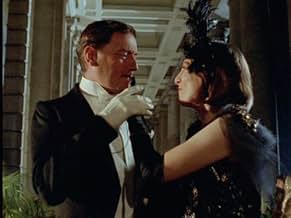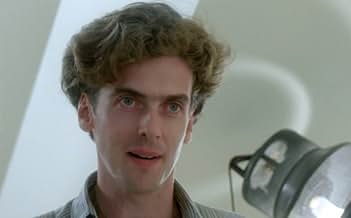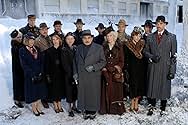Dall'Inghilterra all'Egitto, l'eccentrico ed eccellente detective Hercule Poirot, accompagnato dai suoi compagni eleganti e fidati, si oppone alla sua mente a una serie di inganni di prima c... Leggi tuttoDall'Inghilterra all'Egitto, l'eccentrico ed eccellente detective Hercule Poirot, accompagnato dai suoi compagni eleganti e fidati, si oppone alla sua mente a una serie di inganni di prima classe.Dall'Inghilterra all'Egitto, l'eccentrico ed eccellente detective Hercule Poirot, accompagnato dai suoi compagni eleganti e fidati, si oppone alla sua mente a una serie di inganni di prima classe.
- Candidato a 1 Primetime Emmy
- 6 vittorie e 17 candidature totali
Sfoglia gli episodi
Trama
Lo sapevi?
- QuizBefore playing Poirot, Sir David Suchet played Chief Inspector Japp opposite Sir Peter Ustinov as Hercule Poirot in Agata Christie - Tredici a tavola (1985). Suchet considers his performance as Japp to be the worst performance of his career, while he considers Poirot to be his best.
- BlooperThe opening music and titles to Poirot together set the scene that these are tales from the 1930's. Towards the end of the titles, a stylised and complete Battersea Power Station is shown, which was built in two phases the second of which was not finished until the early 1950's.
- Citazioni
[repeated line]
Captain Hastings: I say, Poirot!
- Curiosità sui creditiThe opening titles have Poirot disembark at a train station and bow to the viewer.
- ConnessioniFeatured in There's Something About Christie... Murder Made Simple (2007)
Recensione in evidenza
There were many one hour and somewhat less two hour episodes of the Hercule Poirot mysteries shown on PBS; and foresighted fans should have taped them then, because when A&E re-runs them, parts of each have to be removed to make room for all the commercials. Very often, the solution at the end flashbacks to scenes that we never saw because of the abridgments and frankly the value of these episodes are reduced considerably. But now Acorn Media is reissuing them in complete versions, with the two hour features on DVD and the shorter ones on VHS. Both series are a delight. The acting genius of David Suchet is enhanced by his usual supporting cast (Hugh Fraser as Hastings, Philip Jackson as Japp, and Pauline Moran as Miss Lemon), the wonderful guest casts, the done-to-perfection ambiance of time and place--the late 20s and early 30s--with all those fabulous art-deco buildings they have managed to find and populate. The first boxed set of 3 episodes contains "The Disappearance of Mr. Davenheim," "The Veiled Lady," and "The Lost Mine." In the first, you might spot a bad flaw in the solution. Hint: how long was the playing time of the average 78 rpm disc back then? The second set includes "The Cornish Mystery" (with a genuine "blonde hussy"), "Double Sin" (with a Sweet Young Thing in Distress), and "The Adventure of the Cheap Flat" (with a neat reversal on the plot of Doyle's "The Red Headed League"). And if too many solutions depend on Poirot overhearing by chance some remark early in the story, well that should teach you to be more alert to these things on future viewings. Also if Poirot is not above breaking the law with a little forced entry now and then, well so did Sherlock Holmes. Released at the same time as the DVD edition of "The ABC Murders," ;Death in the Clouds concerns a killing on an airplane during which Poirot himself is fast asleep. As in all Christie mysteries, the red herrings keep coming; but as in few Christie mysteries, not all that many characters have the opportunity to be near the victim at the right time. (Many mystery writers are fond of "the crowded murder scene" in which every character was able to reach the victim at just the right time.) And although you might feel cheated at the solution--and this one is a tad far fetched--you had so much fun up to that point that you don't really feel like carping. The ABC Murders in my opinion is one of the better Poirot mystery novels and it transfers very well to the screen. First of all do not confuse it with the horrible film "The Alphabet Murders" with Tony Randall. This is a fairly faithful adaptation of the Christie novel that has Poirot and Chief Inspector Japp chasing after a serial killer who matches the initials of his victims with the name of the town in which they are killed. And although the murderer turns out to be not exactly the least likely suspect, there are enough red herrings--one gigantic, the rest minor--to keep you guessing until the inevitable scene in which all concerned are gathered in one place to hear how the Master has solved it all There is a bit of nonsense with Hastings' stuffed souvenir of the South American jungles and the last murder is shown but its purpose is not explained as it is in the original. Very amusing sleuthing for one and all--and a very welcome relief to the grizzly "modern" mysteries now being shown with extreme close-ups, whispered dialogue, and as much gore as possible in each frame.
I più visti
Accedi per valutare e creare un elenco di titoli salvati per ottenere consigli personalizzati
Dettagli
- Data di uscita
- Paese di origine
- Sito ufficiale
- Lingue
- Celebre anche come
- Agatha Christie's Poirot
- Luoghi delle riprese
- Aziende produttrici
- Vedi altri crediti dell’azienda su IMDbPro
Contribuisci a questa pagina
Suggerisci una modifica o aggiungi i contenuti mancanti





































